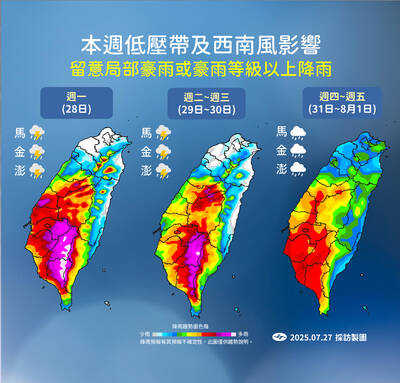Economic academics and former government officials urged the government yesterday to take notice of the risks involved in cross-strait economic and financial cooperation and map out precautionary measures to deal with adverse circumstances.
Taiwan Stock Exchange former chairman Wu Rong-i (吳榮義) made the remarks at a symposium held in Taipei.
Titled “Honey or Knife? The Effects and Consequences of Cross-Taiwan Strait Economic and Financial Cooperation,” the symposium was the first of four sessions of the Taiwan Thinktank Forum hosted by the pro-independence Taiwan Thinktank NGO.
Taiwan Thinktank chairman Chen Po-chih (陳博志) said that as all policies have their pros and cons, risk assessment and precautions or countermeasures were necessary to minimize the harm they might cause. However, he said, the government has only focused on the benefits of economic and financial cooperation with China, while neglecting the potential risks and possible long-term consequences.
“If someone wants to eat honey with a knife, at least you have to let him know that he might get hurt,” he said.
Noting that 40 percent of Taiwan’s total exports go to China and that shipments to China suffered a dramatic 38 percent drop last month, Chen said this has significantly impacted the country’s economy.
“It is like putting all your eggs in one basket,” he said.
Saying that a financial memorandum of understanding (MOU) covering the banking and securities sectors might be signed during the next round of cross-strait talks, Shih said Taiwanese banks would not be equal to their Chinese counterparts in terms of market opportunities because the scale of the Chinese banking market was much larger than in Taiwan.
He said that signing such an MOU would be in China’s favor because.
According to Chinese regulations, he said, only about 10 Taiwanese banks would be able to meet the thresholds for setting up branches and would not be allowed to accept Chinese currency deposits until three years after their establishment, placing severe restrictions on their ability to turn a profit.

The Central Weather Administration (CWA) today issued a "tsunami watch" alert after a magnitude 8.7 earthquake struck off the Kamchatka Peninsula in northeastern Russia earlier in the morning. The quake struck off the east coast of the Kamchatka Peninsula at 7:25am (Taiwan time) at a depth of about 19km, the CWA said, citing figures from the Pacific Tsunami Warning Center. The CWA's Seismological Center said preliminary assessments indicate that a tsunami could reach Taiwan's coastal areas by 1:18pm today. The CWA urged residents along the coast to stay alert and take necessary precautions as waves as high as 1m could hit the southeastern

The National Museum of Taiwan Literature is next month to hold an exhibition in Osaka, Japan, showcasing the rich and unique history of Taiwanese folklore and literature. The exhibition, which is to run from Aug. 10 to Aug. 20 at the city’s Central Public Hall, is part of the “We Taiwan” at Expo 2025 series, highlighting Taiwan’s cultural ties with the international community, National Museum of Taiwan Literature director Chen Ying-fang (陳瑩芳) said. Folklore and literature, among Taiwan’s richest cultural heritages, naturally deserve a central place in the global dialogue, Chen said. Taiwan’s folklore would be immediately apparent at the entrance of the

Speeding and badly maintained roads were the main causes of a school bus accident on a rainy day in Taipei last year that severely injured two people and left 22 with minor injuries, the Taiwan Transportation and Safety Board said. On March 11 last year, a Kang Chiao International School bus overturned inside the Wenshan Tunnel (文山隧道) on the northbound lane of the Xinyi Expressway. The tour bus, owned by Long Lai Co, exceeded the speed limit after entering the tunnel, the board’s investigation found. Sensing that the rear of the vehicle was swaying, the driver attempted to use the service and exhaust

Central and southern Taiwan are to see increasingly heavy rainfall from last night through Friday due to the effects of a low-pressure system and southwesterly winds, the Central Weather Administration (CWA) said. CWA forecaster Liu Pei-teng (劉沛滕) said Tropical Storm Co-May had weakened into a low-pressure system on Saturday, but that it strengthened again into a tropical depression (TD 11) near the seas around Japan's Ryukyu Islands due to favorable environmental conditions. The tropical depression is expected to persist for two to three days, moving west-northwest by this afternoon and reaching China's Zhejiang through the East China Sea tomorrow,